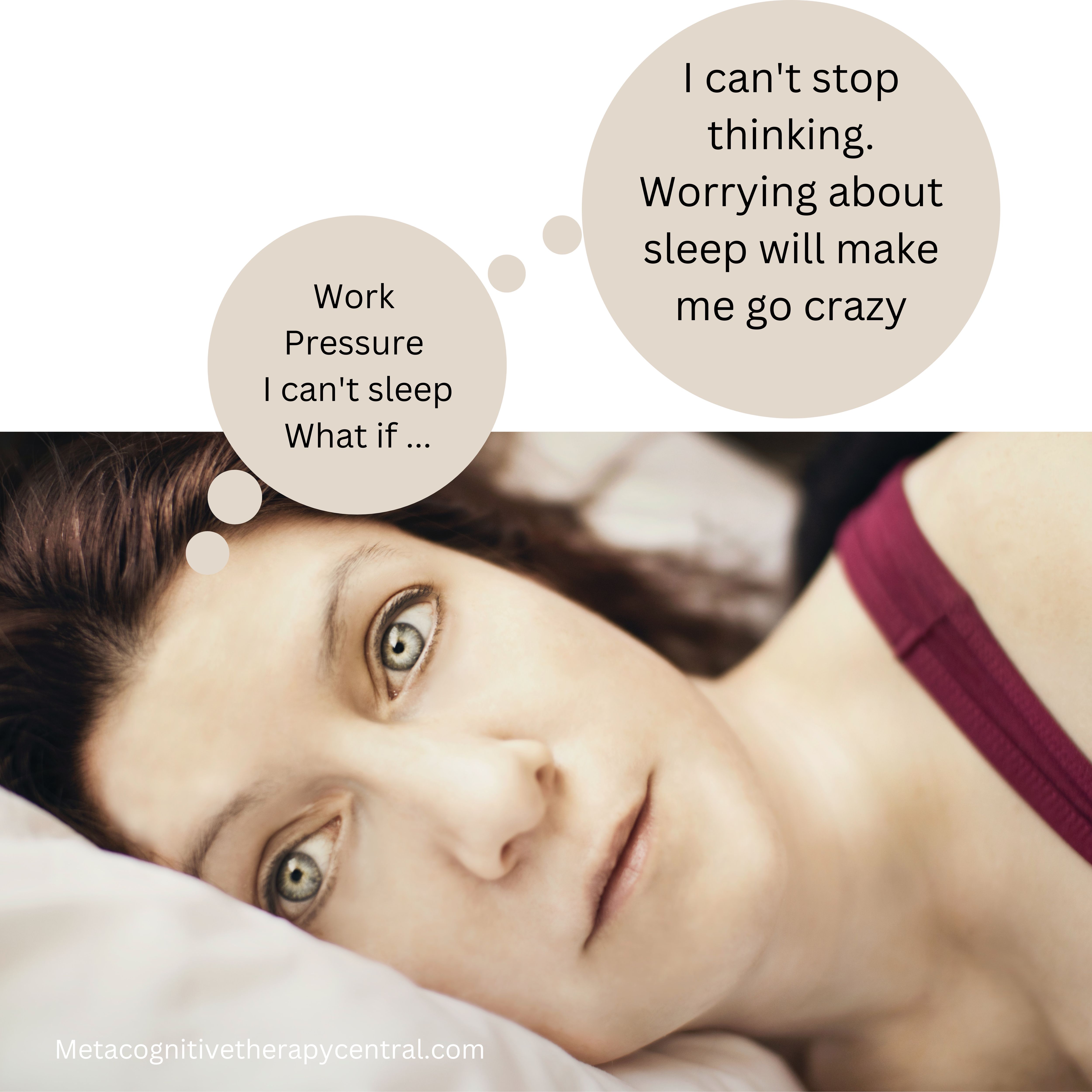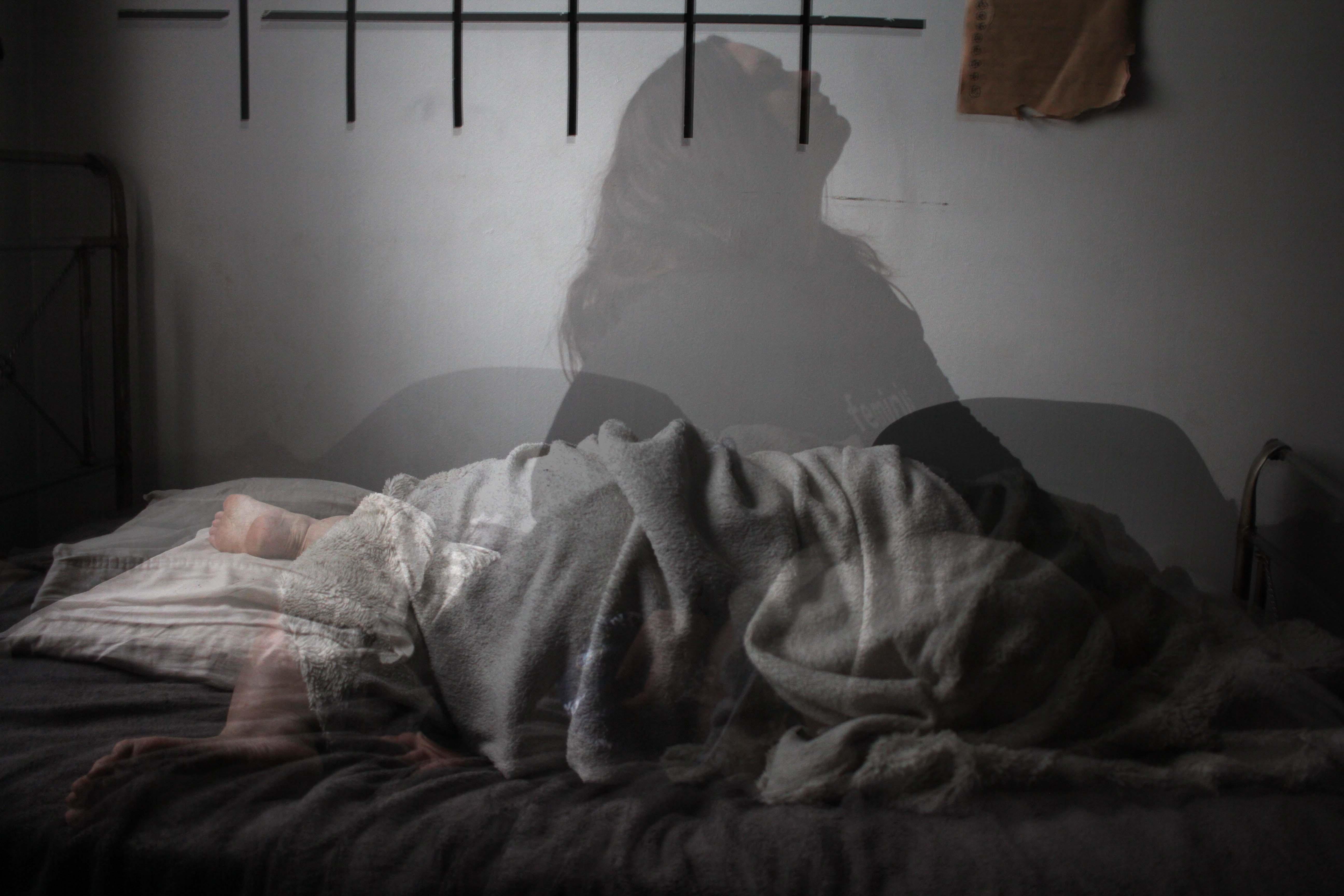
“Ugh, I can’t fall asleep now. Why can’t I stop overthinking? Why is sleep evading me? Why does it always have to mess up my next day? I have such a busy morning ahead, and I can’t afford to have my sleeplessness ruin that important meeting. Ugh, now I can’t sleep at all. Tomorrow’s sleep is going to be a disaster too. I have to wake up early, but it feels like it doesn’t even matter anymore. Thoughts keep rushing in, overwhelming my mind.“
When you’re struggling to fall asleep, even after trying various methods, it might be time to consider a different approach. Metacognitive Therapy (MCT) offers valuable insights for those seeking better sleep.
MCT suggests that trying too hard to force yourself to sleep can actually make it more difficult. Instead, the key is to let go of the idea of trying to fall asleep and practice detached mindfulness with your thoughts, even those about not being able to sleep.
It might seem counterintuitive, but the more you practice detached mindfulness, the easier it becomes to naturally fall asleep.
The reason behind this paradox is that struggling and overthinking about sleep can prevent your brain from relaxing and entering a peaceful state. Additionally, your beliefs about the negative effects of insufficient sleep might contribute to your difficulties.
MCT provides a different perspective on sleep and can help dispel misconceptions. Let’s explore this approach together and find ways to improve your sleep.

Insominia: “Difficulties in initiating and maintaining sleep and early morning awakenings associated with a complaint of sleep dissatisfaction and important daytime consequences that interfere with working and social functioning”
American Psychiatric Association (1)
A metacognitive explanation of insomnia
“Worrying about sleep is harmful to the mind and body”
“I can’t stop worrying about sleep”
“Thinking about sleep will help me figure out ways to overcome insomnia”
Assumptions like these are called metacognitive beliefs and they have a big impact on our ability to sleep well. These beliefs are even more important than specific thoughts and feelings when it comes to affecting our sleep.
When someone has a sleep-related metacognitive belief, they pay extra attention to things that influence their sleep, like thoughts about sleep and feeling tired during the day. At night, they tend to worry and overthink, which makes it harder for them to fall asleep.
According to MCT, the thoughts that people have at night are not the reason why they can’t sleep. Instead, it is how much time people spend worrying and engaging with the thoughts that maintain sleeplessness.
Racing thoughts, restlessness, and tension are not problematic in themselves. When it comes to sleep, worrying and overthinking how you feel is why you can’t sleep.
Understanding Insomnia: A Real-Life Case Study
Sofie struggles to fall asleep. According to traditional insomnia theories, Sofie’s brain is more active at night, leading to negative thoughts and emotions that prevent her from sleeping. To address this, she is advised to follow good sleep habits (setting up a sleep environment with no distractions, going to sleep and getting up at the same time each day, etc.), challenge her negative thoughts, and think more realistic thoughts.
However, metacognitive theory of insomnia presents a different viewpoint. It suggests that it’s not solely Sofie’s feelings and thoughts that keep her awake, but her beliefs about her thinking and her sleep-related behaviors that maintain her insomnia.
Sofie has heard of the risks of insufficient sleep and strongly believes she needs a solid eight hours to function well the next day. This belief makes her closely monitor her sleep patterns and thoughts. When important work commitments approach, she starts checking for signs of fatigue and sleepiness during the day. Thoughts of not getting enough sleep trigger worry:
“What if I can’t sleep tonight? I won’t be able to concentrate at work, and my colleagues will think I’m lazy. Can lack of sleep harm my brain? I can’t continue like this…“
Her worries about sleep become overwhelming, causing her to even cancel social activities if she believes they might affect her sleep.
Sofie sticks to a strict sleep routine, going to bed early even when she’s not tired. She avoids caffeine, takes relaxing showers before bed, and considers sleeping separately from her husband to prevent disturbances. At night, she pays attention to any signs of sleepiness in her body and tries to clear her mind, thinking that it will help her fall asleep.
In essence, Sofie is doing everything she can to overcome her insomnia. However, she doesn’t realize that a large part of her struggle stems from being overly worried about thoughts about sleep, rather than the actual lack of sleep itself.
Attempts to control sleep have the paradoxical effect of perpetuating sleeplessness

Unhelpful strategies that fuel insomnia
Let’s explore the ineffective strategies that keep insomnia going, based on the example we discussed and the insights from MCT.
| The CAS in insomnia | Why it maintains insomnia |
| Worrying and ruminating | Keeps the mind awake and alert and causes more intrusive thoughts |
| Suppressing thoughts | Does not work and leads to even more intrusive thoughts |
| Monitoring for signs of sleepiness, fatigue, alertness | This leads to biased attention and misinterpretation of normal symptoms that are not necessarily caused by a lack of sleep. For example, feeling tired during the day is normal for everybody, even for those who get sufficient sleep. |
| Routines to promote sleep | Causes a preoccupation with sleep, and strengthens the belief that worrying about sleep can’t be controlled |
| Avoiding things that could negatively affect sleep | This leads to intrusive thoughts, triggers worry and maintains insomnia |
| Using distraction to fall asleep | Reinforces the belief that worry and rumination can’t be controlled |
| Sleep medication or other remedies for sleep | Reinforces the belief that worry and rumination can’t be controlled and that sleep doesn’t come naturally |
| Going to bed even when not tired | This leads to intrusive thoughts, triggers worry, and maintains insomnia |
The strategies mentioned above all have one thing in common: they try to fight against sleeplessness. Surprisingly, they often make the problem worse instead of helping. This is what I’ve seen with clients who struggle with sleep. The strategies they use to overcome insomnia end up backfiring. These strategies are part of something called the Cognitive Activation Syndrome (CAS), which, according to MCT, keeps intrusive thoughts, negative emotions, anxiety, and depression going.
Research on insomnia confirms these findings (2). Trying to control intrusive thoughts actually takes longer to fall asleep. For example, suppressing negative thoughts can delay sleep. Studies also show that people with insomnia tend to worry and catastrophize a lot.
“I’m losing control”, “I’m not going to cope”, “I will lose my job”
When you worry too much, it increases anxiety and makes your body more alert, making it harder to fall asleep. Excessive worrying also leads to more intrusive thoughts, which is why people with insomnia try to push them away at night or perform rituals to help them sleep.
Just like trying to suppress thoughts, performing rituals shows resistance to accepting sleeplessness and actually makes it harder to sleep (3)(4). When these strategies don’t work, it causes more stress and worry. But the more stressed and worried you are, the more difficult it is to fall asleep.
This tendency is not limited to people with insomnia. Even good sleepers who attempt to quickly fall asleep, particularly when anticipating significant events the following day, often struggle to do so.
How to give your brain a chance to rest at night
To overcome insomnia, the first step is to stop using strategies to try and fall asleep.
In MCT, there is a simple solution to sleeplessness: embracing detached mindfulness as an alternative to worry and trying to suppress thoughts. With detached mindfulness, you become aware of intrusive thoughts without getting caught up in them. Instead, you simply observe the thoughts that arise and let them be. This will help your brain rest and eventually, help you sleep better.
Detached mindfulness example
Here is an example of how you can practice detached mindfulness:
Imagine your thoughts as scenes being projected onto a movie screen. With detached mindfulness, you take a step back and simply observe these scenes without getting overly involved or reacting to them. You become the mindful observer, fully aware of the thoughts playing out on the screen of your mind, but without getting entangled in their content.
When practicing detached mindfulness, the only goal is to avoid getting caught up in thoughts. Remember this to avoid turning detached mindfulness into yet another coping strategy that could inadvertently perpetuate insomnia.
Keep practicing observing and acknowledging sleep-disturbing thoughts without getting caught up in them. Do this every night to get better sleep.

Changing Your Relationship with Sleep
Worrying about the consequences of insufficient sleep can make you feel more tired and underestimate the amount of sleep you’re actually getting. Research shows that people with insomnia often overestimate how long it takes them to fall asleep and underestimate the total duration of their sleep. This can lead to increased anxiety and worry, making insomnia symptoms worse.
Interestingly, those who frequently struggle to fall asleep or wake up too early tend to underestimate their actual sleep time by more than two hours on average. Older studies have also found that there is only a 35-minute difference in objective sleep duration between people with and without insomnia.
If you’re having sleep difficulties, it’s possible that you’re underestimating the amount of sleep you’re getting and how much sleep you truly need to function well. Additionally, remember that the feeling of poor sleep quality and fatigue may be more related to excessive worrying rather than an actual lack of sufficient sleep. Constantly worrying about not getting enough sleep throughout the night can leave you feeling tired and less focused the next day, as worrying takes a toll on your mental energy.
Letting go of the need for a specific 8-hour sleep duration doesn’t mean you shouldn’t think about your sleep needs at all. Instead. But you can learn to recognize that thoughts about sleep are simply thoughts, without giving them too much significance.
Dealing with insomnia is like trying to free your finger from a Chinese finger trap. The more you struggle to change your thoughts or force sleep, the harder it becomes to sleep. Sometimes, the effort to alter our feelings can make things worse instead of better.
Summary: A simple guide to overcoming sleeplessness
| Change from | Change to |
| Paying too much attention to how tired you feel during the day and whether you feel like you’ll be able to fall asleep at night | Pay attention to the activities you’re doing during the day |
| Going to bed when you think you should | Allow the feeling of sleepiness to guide you when to go to sleep |
| Absorbed in fixing your sleep problems | Live life according to your values despite how you feel (what is important to you outside of sleep?) |
| Worrying about the harmful effects of the lack of sleep | Learn that the mind can self-regulate and help you get sufficient rest if you don’t worry too much about it |
| Fighting how you feel and pushing intrusive thoughts away at night | Practice detached mindfulness |

References
- American Psychiatric Association (2013). Diagnostic and Statistical Manual of Mental Disorders. 5th Edn. Arlington, VA: American Psychiatric Association.
- Harvey AG, Greenall E. Catastrophic worry in primary insomnia. J Behav Ther Exp Psychiatry. 2003 Mar;34(1):11-23. doi: 10.1016/s0005-7916(03)00003-x. PMID: 12763390.
- Wegner, D. M. (1994). Ironic processes of mental control. Psychological Review, 101(1), 34–52. https://doi.org/10.1037/0033-295X.101.1.34
- Ong JC, Ulmer CS, Manber R. Improving sleep with mindfulness and acceptance: a metacognitive model of insomnia. Behav Res Ther. 2012 Nov;50(11):651-60. doi: 10.1016/j.brat.2012.08.001. Epub 2012 Aug 20. PMID: 22975073; PMCID: PMC3466342.
- Scarlett, S., Nolan, H., Kenny, RA., O’Connell, M.D.L. Discrepancies in self-reported and actigraphy-based sleep duration are associated with self-reported insomnia symptoms in community-dwelling older adults, Sleep Health, Volume 7, Issue 1, (2021), Pages 83-92, ISSN 2352-7218, https://doi.org/10.1016/j.sleh.2020.06.003.
- Chambers, M. J., & Keller, B. (1993). Alert insomniacs: Are they really sleep deprived? Clinical Psychology Review, 13, 667–682.
